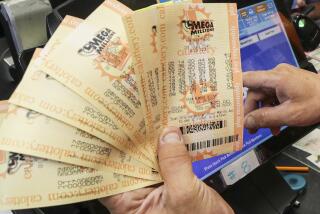Powerball -- one more way to lose my money
- Share via
Good news for gamblers who like ridiculous odds: Powerball, the multistate lottery that just produced a $587.5-million jackpot (that Californians couldn’t get in on in the state), is coming to California in April. Powerball joins two other games with big winnings -- Mega Millions and SuperLotto Plus -- as well as an assortment of games that throw off smaller jackpots (generally under a million dollars).
Now we can all look forward to yet more ways to lose our money.
As the daughter of a statistician -- who railed against the lottery -- I understand the statistical lunacy of playing the game: better chance of being hit by lightning, etc. Interestingly, a Kansas man was hit by lightning shortly after buying three Mega Millions lottery tickets in April, according to the New York Daily News. (And, no, he did not win the lottery as well.)
A friend of mine has a karmic fear of playing the lottery. She believes that if she were to beat the odds and win, then what rare odds of something bad happening (the lightning thing) would she be subjected to? She has some experience with this. She once knew someone who won the lottery, and then got cancer and died. (Of course, no one who gets a rare cancer thinks that somehow their chances of winning the lottery go up.)
And I understand when lottery officials introduce a new fillip in a game -- as they did when they changed the California state lottery from a game of picking any six numbers to a game of picking six numbers but designating one of them as the “mega” -- and enthusiastically say this means “more ways to win,” when really what it means is more probability of not winning.
I realize that the chances of winning the top jackpot in the two games I play are based on the mathematical odds of hitting the chosen numbers. The lottery is not a raffle. No matter how many people play, the odds don’t change. (Although because the more people play, the bigger the jackpot, if you must take a stupid chance, you might as well do it when the jackpot is huge; even my late father begrudgingly noted that.)
However, none of this has stopped me from shamelessly playing the lottery. I’ve played the same six numbers in various combinations for so long that I worry if I did stop playing and those numbers won, I would need intensive psychotherapy for at least a year to recover from the trauma. (A psychiatrist friend recommended that if I stopped playing, I simply stop checking the winning numbers and then I wouldn’t know. I doubt this would work for me.)
I’ve won $3 here, $10 there in smaller prizes. I think the most one ticket ever netted me was about $57. I’m pretty sure my total expenses in ticket buying over the years outweigh my earnings.
Of course, the reason we all get sucked into playing these games is that a single chance at so much costs so little. It costs a buck to buy a ticket in our lotteries. The odds of matching all the correct numbers to win the top prize in SuperLotto Plus, according to the California Lottery Commission, are 1 in 41,416,353.
In the multistate Mega Millions game played here, there are more numbers to choose from, and the chance of picking the five winning numbers and the correct Mega number are 1 in (ready for it?) 175,711,536.
The coming Powerball lottery gives you technically, but negligibly, better odds: 1 in 175,223,510. However, the starting jackpot never goes below $40 million, which is a higher starting point than our current lotteries have.
But Powerball also costs more -- $2 a ticket. For a regular lottery gambler -- who hasn’t completely lost her mind -- that gives me pause to reconsider. I mean, enough is enough. I have until April to decide, of course. One thing I’m sure of: If I don’t play Powerball, I better take my shrink friend’s advice and not check the winning numbers.
ALSO:
Do the right thing on same-sex marriage
Arizona governor picks another fight with President Obama
More to Read
A cure for the common opinion
Get thought-provoking perspectives with our weekly newsletter.
You may occasionally receive promotional content from the Los Angeles Times.







